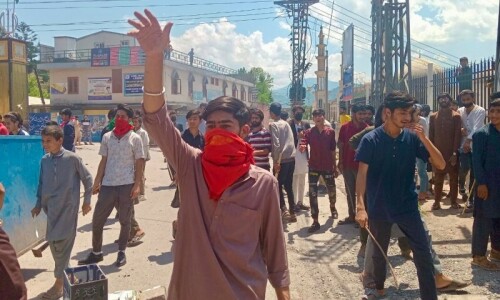HISTORICALLY, those opposed to female enfranchisement have adopted the ludicrous argument that women should keep to their sphere at home, because engaging in politics as voters and candidates is a masculine pursuit. In fact, barring women voters is an exclusionary practice and one that must be stopped. Take the example of KP, where religious-right and ostensibly progressive political parties often collude to bar women from participating in the polls. Recent reports that women did not vote during by-elections for two districts in Upper and Lower Dir are a stark reminder of this deplorable fact. The ECP might have ambitious plans to register 1.2m missing women voters before the 2018 election, but it should first nullify poll results in constituencies that bar women from casting their ballot; indeed, it is legally mandated to do so in places where women have cast less than 10pc of the vote. So, it is imperative for the electoral watchdog to conduct a re-poll in the two districts where not a single woman cast her vote — even though thousands have been registered in Upper and Lower Dir. Unfortunately, local representatives of political parties that prevent women from polling in conservative swathes of KP, Fata and Punjab are hardly penalised. Hence they continue with their regressive ways, either failing to facilitate women voters or outright curtailing their vote.
Such disenfranchisement is a routine discriminatory practice in societies where men exercise complete control over women’s lives. In the run-up to the 2013 election, for instance, again in Upper Dir, the PTI signed an agreement with other parties barring women from voting and stipulating large fines for parties breaking the agreement. Resultantly, one woman’s vote was recorded though 38,910 women voters were registered. Sadly, political parties have failed to challenge social pressures as they fear that doing so would increase their risk of losing traditional seats. Only when the ECP pursues the issue of such deliberate disenfranchisement and organises a re-poll in constituencies where irregularities have been established can there be drastic change. Moreover, with a 36pc increase in women voters in the tribal areas, it would be beneficial for political parties to be educated before the 2018 election on the importance of women’s participation in the electoral process and on how best to mobilise their vote. Duty-bound to protect this constitutional right of women, the electoral watchdog must not tolerate any illegal manoeuvres by political parties.
Published in Dawn, December 27th, 2017









































